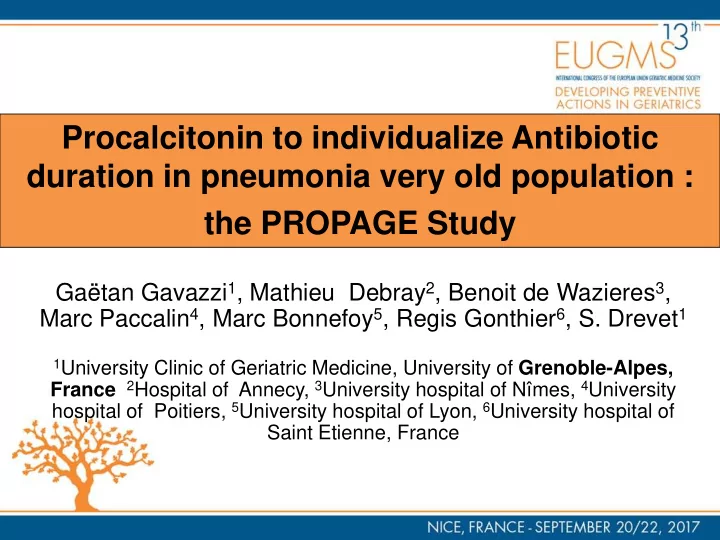

Procalcitonin to individualize Antibiotic duration in pneumonia very old population : the PROPAGE Study Gaëtan Gavazzi 1 , Mathieu Debray 2 , Benoit de Wazieres 3 , Marc Paccalin 4 , Marc Bonnefoy 5 , Regis Gonthier 6 , S. Drevet 1 1 University Clinic of Geriatric Medicine, University of Grenoble-Alpes, France 2 Hospital of Annecy, 3 University hospital of Nîmes, 4 University hospital of Poitiers, 5 University hospital of Lyon, 6 University hospital of Saint Etienne, France
CONFLICT OF INTEREST DISCLOSURE Biomérieux Help to obtain PCT Assays
Background Infectious diseases and pneumonia are more difficult to diagnose Empiric ATBic therapy are often inappropriate (20-40%) Antibiotic consumption leads to Antibiotic resistance Decrease the global consumption of ATB per individual contribute to Individual and collective benefice = numbers of prescription or duration of ATbic Schuetz P Cochrane data Syst Rev 2012, Stucker F JAGS 2005, Gavazzi G Lancet Inf Dis 2002, Antibiotique 2010
Background PCT is reliable biomarkers to help to individualize ATB duration in different subsets of population and infection RTI duration 3.47 lower (3.78 to 3.17 lowerPneumonia/ Severe sepsis in ICU) PCT alogorithm and clinical judgment No study specific to the very old population = raising hospitalized population with numerous comorbidites and high risks of severe diseases. Schuetz P Cochrane data Syst Rev 2012, Stucker F JAGS 2005, Gavazzi G Antibiotique 2010
AIM of the STUDY Are PCT serial measurements may reduces antibiotic duration in pneumonia (community or nosocomial) in patient older than 80 years ?
Methods RANDOMIZED CLINICAL INTERVENTIONAL TRIAL 6 acute geriatric wards from different areas in France. (Annecy, Grenoble, Poitiers, Nîmes, Lyon and Saint Etienne) Inclusion criteria associated: > 80 years old, receiving ATbt <3 days for pneumonia, and had a PCT measurement. PCT was measured every 2 days in both groups (from Day 2 to day 8 and at the end of treatment or at discharge).. All characterisitcs Patients / pneumonia ( severity) Registred in clinical trial NCT02173613
Results Flow shart
Characteristics of patients / pneumonia similar in both groups ADL : 68% between 4 to 6/6 at D-15, 52%,), IADL D-15 : 43% with IADL<3/8
Characteristics of patients / pneumonia PCT LEVELS at admission and evolution p = 0.5 similar in both groups
Rate of ATBIc duration Intention to treat : PCT group 8. 4 days (±3.1) Control group 10.7 days( ±3.6) P=0,001 Contrôle PCT 91% 100% 72% 80% 54% 44% 60% 40% 20% 0% D2 D4 D6 D6 D8 D8 ATBic ic duration n ( days)
Rate of ATBIc duration Per protocol : PCT group 7. 2 days (±3.1) Control group 10.7 days( ±3.6) Outcome day 45 and 90 No differences 89.5% of the control group 84% in the PCT group had a good outcome Algorithm follow up : 52%
Discussion / Conclusion: PCT algorithm is useful to individualize the duration of ATBt for Hospitalized pneumonia even in very old and disable population. PCT < 0.25/ng/ l is the threshold without poorer outcome PCT dosage in between day 4 and 6 may stop ATBic in more than 60% of patients.
Thank you for your Attention ……. too less …. …..or too much “The good physician treats the disease; the great physician treats the patient who has the disease.” William Osler
Recommend
More recommend